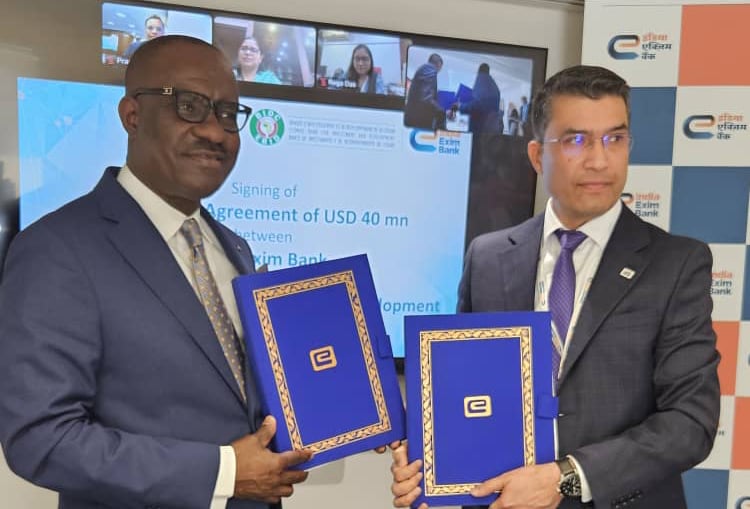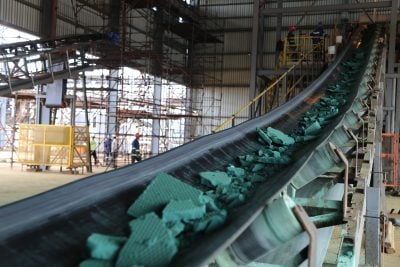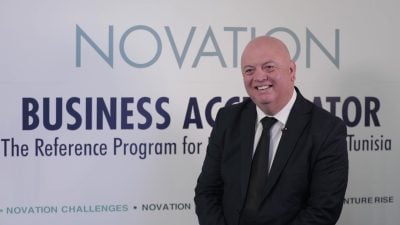This article was produced with the support of ECOWAS Bank for Investment and Development
The ECOWAS Bank for Investment and Development (EBID) has deepened its long-standing partnership with India following the signing of a new commercial credit line worth $40 million with India Exim Bank. The agreement, concluded in London on 14 August, underscores the growing financial and strategic ties between West Africa and India at a time when the sub-region faces pressing demands for infrastructure, energy and social development.
The facility, signed by EBID President and Chairman of the Board of Directors, Dr George Agyekum Donkor, and Ashok Kumar Vartia, Chief Executive of India Exim Bank’s London branch, will be channelled towards supporting developmental projects across the 15-member Economic Community of West African States. For EBID, the arrangement reflects its drive to mobilise resources from diverse partners to accelerate growth in a region where infrastructure gaps, climate shocks and demographic pressures pose complex challenges.
Speaking at the ceremony, Dr Donkor praised India Exim Bank for what he described as a consistent and tangible commitment to Africa’s economic transformation. “This new agreement is not just about financing,” he said. “It is about creating opportunities for our people and ensuring that critical sectors such as energy, health, transportation, agriculture and infrastructure receive the support they need to underpin sustainable growth.”
Building resilience through partnerships
The ECOWAS Bank for Investment and Development, which is wholly owned by the 15 ECOWAS Member States, has increasingly positioned itself as a bridge between international capital and regional priorities. With limited fiscal space among many member governments, EBID has sought to expand its network of strategic lenders who can help unlock the financing required to build resilience in volatile global conditions.
Dr Donkor noted that West Africa remains particularly vulnerable to global disruptions, from energy price shocks and supply chain dislocations to the effects of climate change. In that context, long-term partnerships such as the one with India Exim Bank take on added importance. By ensuring the steady flow of resources for large-scale projects, EBID aims not only to bolster growth but also to provide a buffer against external turbulence.
The credit line is expected to target sectors that directly impact livelihoods and competitiveness. Investment in energy will help address chronic power deficits that have constrained industrialisation, while infrastructure financing is set to ease transport bottlenecks and lower the costs of doing business. Support for agriculture will enhance food security, and funds directed towards health and social projects will improve resilience in the face of public health crises.
India’s expanding African footprint
India Exim Bank has made Africa a key pillar of its international operations, offering financial, advisory and capacity-building services to strengthen trade and investment ties between the continent and Indian businesses. Since 2006, when it extended its first credit line to EBID, the bank has provided six separate facilities amounting to $1.14 billion. These have helped finance a wide range of projects across West Africa, including power plants, road networks and essential infrastructure, often executed by Indian contractors and exporters.
For Ashok Kumar Vartia, the signing of the $40 million facility in London marks “a key milestone” in a relationship that has steadily matured over nearly two decades. “Our commitment is not limited to the provision of finance,” he observed. “It is about creating pathways for deeper interactions and mutual benefits between India and Africa.”
The sentiment was echoed by Ms Trupti Mhatre, General Manager at India Exim Bank, who emphasised that the structure of the loan will give West African governments and enterprises much-needed breathing space. “This long-tenor credit line provides critical support to infrastructure projects being executed by Indian exporters,” she said. “By combining financial sustainability with development objectives, it fosters closer partnerships between India and the continent.”
A model of South-South cooperation
The EBID–India Exim Bank relationship exemplifies the broader trend of South-South cooperation, in which emerging economies are forging mutually beneficial partnerships outside traditional donor-recipient frameworks. India’s growing engagement with Africa is rooted in both strategic and developmental considerations. On the one hand, it provides Indian businesses with access to new markets and opportunities. On the other, it delivers resources and technical expertise that African institutions require to achieve their development agendas.
West Africa, with its population of over 400 million and abundant natural resources, represents a particularly attractive partner for India. At the same time, the region’s financing gap for infrastructure alone is estimated in the tens of billions of dollars annually, highlighting the urgency of external support. By blending concessional and commercial instruments, banks such as EBID are working to ensure that projects can be financed in ways that are both sustainable and growth-enhancing.
EBID’s development mandate
Since its establishment in 1975, EBID has played a critical role in translating the aspirations of ECOWAS into concrete outcomes. Its mandate spans financing for both public and private sector projects that contribute to regional integration and economic transformation. Over the past decade, the bank has financed ventures ranging from cross-border highways and renewable energy plants to agricultural value chains and small and medium-sized enterprises.
Dr Donkor has consistently stressed that partnerships are central to fulfilling this mandate. Under his leadership, EBID has sought to cultivate stronger ties not only with India but also with development finance institutions in Europe, Asia and the Americas. The objective is to create a diversified base of resources that can support the wide-ranging needs of ECOWAS Member States.
The Bank’s approach is also informed by the recognition that development is multidimensional. Infrastructure investments must be matched by support for human capital, social services and environmental sustainability. By directing resources towards health and education as well as transport and power, EBID aims to ensure that growth is inclusive and broad-based.
Looking ahead
The latest credit line from India Exim Bank, while modest in size compared to some of EBID’s other facilities, carries symbolic weight. It reaffirms the durability of a relationship that has spanned almost twenty years and signals confidence in the bank’s ability to manage and deploy funds effectively. It also comes at a time when West Africa is seeking to reposition itself in the global economy, leveraging both its demographic dynamism and its drive towards regional integration.
As global financial conditions tighten and traditional development aid stagnates, the ability of African institutions to mobilise alternative sources of capital is increasingly crucial. Partnerships such as that between EBID and India Exim Bank demonstrate that innovative financing arrangements remain viable, even in a challenging environment. They also illustrate the potential of Africa to act as a partner of choice for emerging economies that see long-term opportunities in deepening ties with the continent.
For EBID, the focus now will be on translating this financing into tangible outcomes. Success will be measured not simply in the disbursement of funds, but in the roads built, the power supplied, the farms supported, and the lives improved. Dr Donkor is clear about this imperative: “Every dollar we mobilise must contribute to the transformation of our economies and the betterment of our people.”
A partnership with promise
As West Africa continues to grapple with developmental bottlenecks and external shocks, the partnership between EBID and India Exim Bank stands as an example of pragmatic, mutually beneficial cooperation. It bridges continents, aligns economic interests with social objectives, and reinforces the idea that development is best pursued through collaboration rather than dependency.
In the years ahead, both institutions are expected to explore new opportunities to expand their engagement, whether through larger credit lines, joint ventures or innovative financing instruments. For now, the $40 million agreement signed in London offers a fresh injection of momentum. It is a reminder that even relatively small facilities can make a difference when strategically directed, and that partnerships grounded in trust and shared vision have the power to transform regions.

 Sign in with Google
Sign in with Google 



